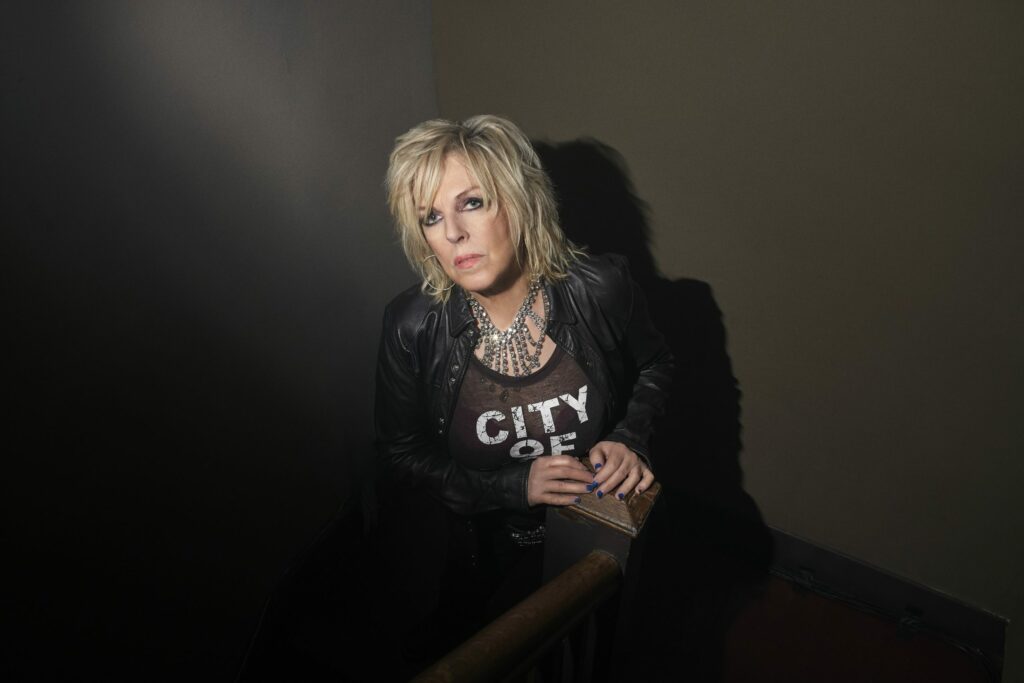Lucinda Williams Defines Space Between Bluesy Rock and Country

By Mike Luginbill
As a singer-songwriter, Lucinda Williams is hard to classify. In her own words, she falls somewhere between rock and country. That may be true, but after her recent performance in Annapolis, I would put her in the category of some of our great American 20th-century balladeers with people like Nat King Cole, Ella Fitzgerald, and Bing Crosby.
She sings with a deep, genuine southern drawl. With her rich alto voice, she stretches, re-pitches and modulates even single syllables. She ably tells a story with each song, and it was fitting that she was the capstone performer for the inaugural Annapolis Songwriters Festival last weekend.
Williams performed at Maryland Hall, in what used to be the auditorium of the old Annapolis High School before it was turned into an arts center. The Hall retained such touches as the old stairwells, original brickwork, and chicken wire glass while adding spaces more suitable for painting, pottery, and other arts. Some big names have performed there, including Randy Neuman, Emmylou Harris, and many others. There is an inscription over the stage that reads, “The measure of a man is the depth of his convictions, the breadth of his interests, and the height of his ideals.” Something to ponder.
In the spirit of the songwriters’ festival, Williams generously discussed her songs, describing how they came to be written. In essence, she told stories about her stories. Her breakout “Car Wheels on a Gravel Road” was a collection of vignettes from the days when her family would take car rides to different places in the South, with lines like “Don’t make me stop this car,” and “When I get home this place had better be picked up.” She mentioned her father affectionately a couple of times. When he first heard the song, he identified her as one of the kids in the back seat.
Another fan favorite, “Lake Charles,” was a modern requiem to a lost friend who knew all of the cool places and “juke joints” where you might hear a blues band or get something to eat. In “Pineola,” Williams laments a creative young man who took his own life. She lauded fellow singer-songwriter Bruce Springsteen for being forthcoming about his struggles with depression, and shared her feelings on the subject in “The Big Black Train,” saying it was a ride “you don’t want to be on.” She continued on the theme with “Blue.” She expanded her repertoire on emotional darkness with a rendition of the haunting “Pray the Devil Back to Hell.”
Love, lost love, difficult love and potential love are persistent themes in Williams’ body of work. Examples from this gig were “Steal Your Love,” “Protection,” “Right in Time,” “People Talkin’,” and “Honeybee.”
I heard Williams several years ago at Rams Head in Annapolis when she accompanied herself on a guitar. Last night, she had a band consisting of a drummer, a bass guitar player, lead guitar, and backup. Williams introduced them all and noting her affinity for people’s roots, shared where they were from. They were mostly Westerners hailing from Alaska, Arizona, San Francisco, and Ventura County, California. They were a versatile lot, with the bass player putting down his electronic axe for a standup bass at one point. He took at least one solo himself and in one number he banged on the back of his bass guitar to provide rhythmic accompaniment. The rhythm guitar player also played an electric mandolin and the pedal steel guitar, providing a nice country flavor to the performance. The percussionist mostly provided a rock-style backing to the performance. Once, he ended the number with a simple, effective bell. The only negative in the whole performance, in my opinion, was that the percussionist sometimes overpowered the rest of the ensemble, including Williams.
Late in the performance, Williams revealed that she had suffered a stroke and that her band backs her up “in more ways than one.” She was optimistic about her recovery, but after she mentioned this, it became apparent that she was slightly favoring her non-affected right side, holding the microphone with her right hand, bouncing on her better leg, etc. From her on-stage presence, it appeared that it could be difficult to fret her guitar with her left hand, at least right now. Still, this concert was billed as the start of a world tour, so hopefully, she will continue to regain her strength.
After a busy hour and a half, it looked like Williams had given her all, physically and emotionally. The crowd clamored for an encore, which she provided, with a song about a Marine. Williams noted that, despite her sometimes-depressing subject matter (suicide, depression, loss of friends, “loss of joy”), she felt that she was an optimist, and this sentiment came through to her audience.
With a guitar in her hands, or in this case, her band’s hands, Williams communicated deeply with her fans. She thanked the audience for being supportive, stating “your presence is a gift,” and noted that this was her first show after a lengthy break from performing. She said that during her travels she found one of her songs in a bar’s karaoke playlist, and said, tongue-in-cheek, that this really proved that she had “made it.”
